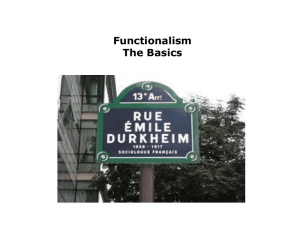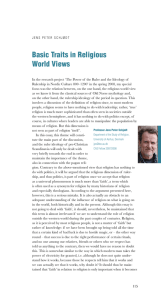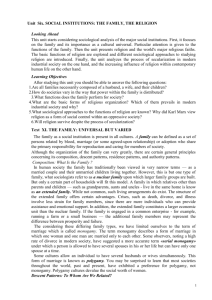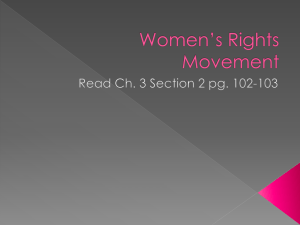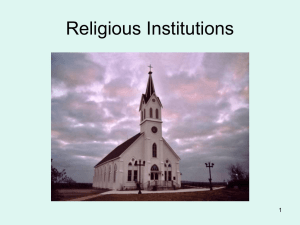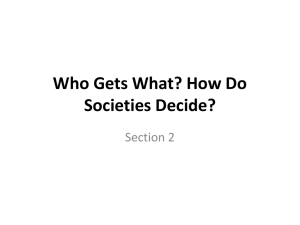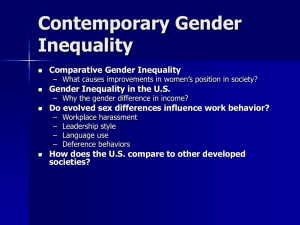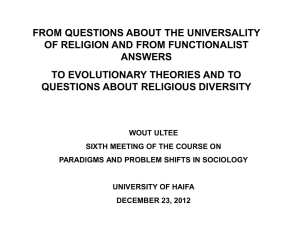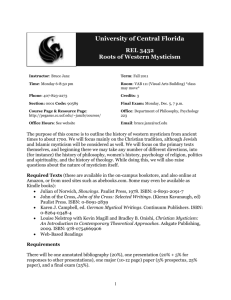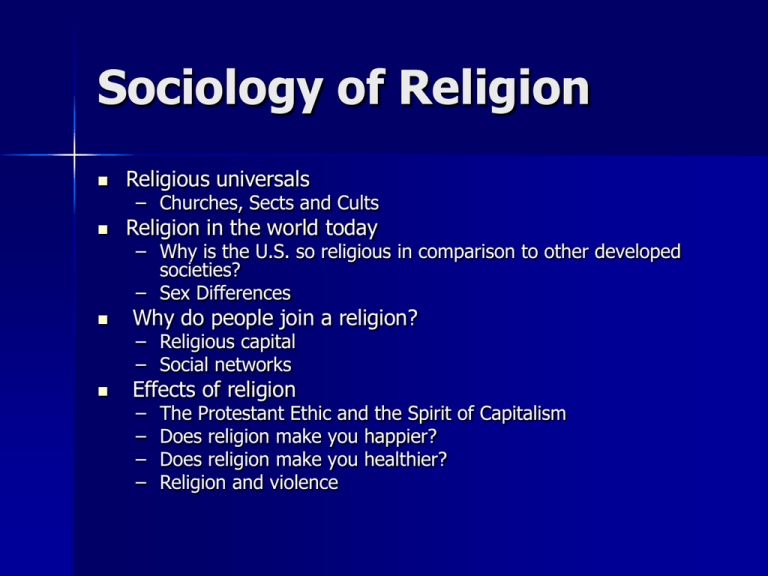
Sociology of Religion
Religious universals
– Churches, Sects and Cults
Religion in the world today
– Why is the U.S. so religious in comparison to other developed
societies?
– Sex Differences
Why do people join a religion?
– Religious capital
– Social networks
Effects of religion
–
–
–
–
The Protestant Ethic and the Spirit of Capitalism
Does religion make you happier?
Does religion make you healthier?
Religion and violence
Religious universals
Religion is found in all human societies
In simple societies, religions tend to
be polytheistic
– have many gods, spirits or other
supernatural beings
The spirit No Face meets a young girl in the Japanese movie “Spirited
Away.” Beliefs in spirits are common in pre-industrial societies.
In more developed societies, religions
tend to be monotheistic
– Have beliefs in one god or spirit
– Religion in agrarian societies tends to be
monotheistic
– Islam, Judaism and Christianity are
products of agrarian societies
In more developed societies, religion is
more complex and is often
bureaucratized
There are hierarchies of priests or
religious leaders
Most religions are characterized by the
four “Ms”
– Magic
– Membership
– Morality
– Mysticism
Magic
This refers to beliefs in spirits and
gods who intervene in human affairs.
Membership
A religion requires participation in the
rituals of the religion e.g. attending
and/or participating in ceremonies,
services
Morality
To be a part of a religion requires
following certain rules about behavior
Mysticism
All religions involve mysticism to some
extent
Mysticism is contact with the divine
Churches, sects and cults
Churches are established religious
organizations of a society
Sects are more informal religious
organizations that are still part of the
mainstream religion
– stress the emotional content of religion
Cults are new religious movements
Members of the polygamist sect, Fundamentalist Church of Jesus
Christ of Latter Day Saints (FLDS), leave a courthouse. These
women were residents of the Yearning for Zion Ranch in Eldorado
County, Texas.
Many religions start out as cults or
sects, but end up as churches
– E.g. Christianity – began as a sect of
Judaism, became a cult in Rome, and
now is a mainstream church in many
societies.
Secularization hypothesis
The secularization hypothesis suggests
that as societies industrialize and
become more complex, religion
diminishes in importance.
Evidence that the hypothesis is correct
The U.S. is the most religious of the
developed societies.
Vast majority of Americans also self
identify themselves as religious
Few Americans (15%) say they have
no religion
Within the U.S., people are more
religious in the south and the midwest
People are less religious in New
England and the Pacific Northwest.
No religion population by
state
Why is the U.S. so religious
compared to other
developed societies?
One theory of why this is so is the
“religious economies” theory
Suggests that religion is strong in the
U.S. because there are many
competing religions.
Religions compete to meet people’s
spiritual needs
In European countries, there is usually
a state-sponsored church that may not
always offer what people want, so
fewer people are religious
Sex differences in religion
Around the world, women are more
likely than men to be religious.
Why is this so?
One explanation is that men are more
likely to take risks, and not being
religious may be considered a “risk”
Why do people join a
religion?
One reason is because their families
belong to the religion
– Often referred to as “religious capital”
– People know people in the religion and
are familiar with the doctrines, traditions,
rituals etc. of the religion
Another reason is because people
have friends who have already joined
the religion
– Social networks are an important way
people join new religions
Effects of Religion
In his essay “The Protestant Ethic and the
Spirit of Capitalism,” Weber argued that
Protestantism was important for promoting
the beginning the capitalism
Protestant behaviors such as hard work,
thrift, honesty and the avoidance of luxury
helped capitalism by promoting commerce
and providing savings for investment.
Religion and happiness
Studies suggest that religious people
are happier than non-religious people
Religion and health
Studies also suggest that religious
people are healthier.
Religion and violence
Throughout history, a great deal of
violence has been perpetuated in the
name of religion.
Does religion promote violence?
No – but some leaders have used
religious beliefs to encourage violent
behavior.



